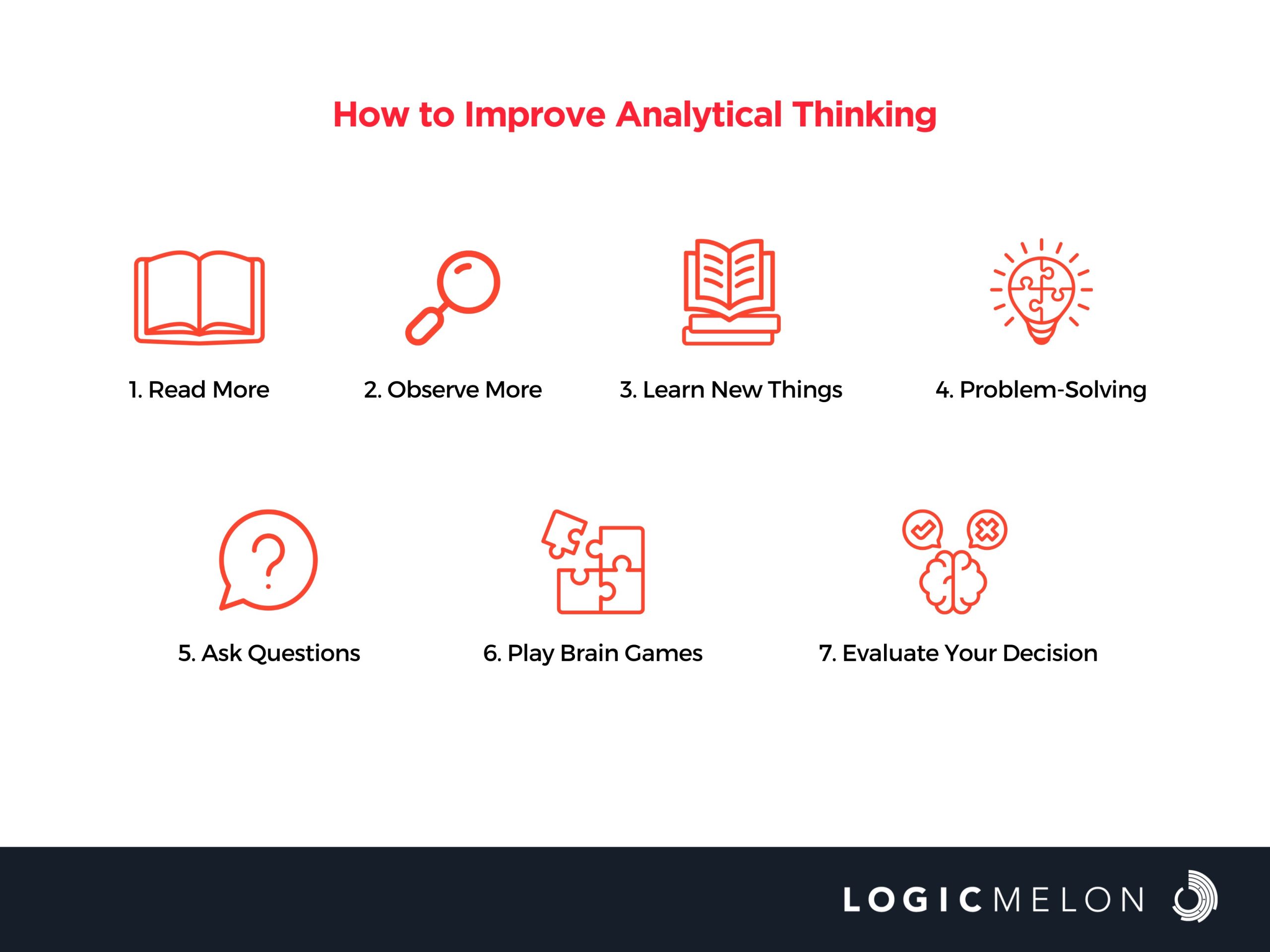The Ultimate Guide to Analytical Thinking
Analytical thinking is the ability to break down complex problems or ideas into smaller, more manageable pieces in order to reach a conclusion. While some people have a natural ability for analytical thinking, it is a skill that can be developed with a few changes to your routine. In this post, we’ll explore the stages and qualities of analytical thinking and provide tips on how to improve your analytical skills.
We’ll also discuss the benefits of analytical thinking in both personal and professional settings.
Stages of Analytical Thinking
Analytical thinking involves several processes, including:
- Defining a subject, issue, or difficulty
- Gathering information through testing and observations
- Developing answers or increasing your understanding of the topic
- Putting your newly learned knowledge to use by attempting to put creative solutions or ideas to the test
- Assessing and putting your new knowledge into practice, and conducting a post-analysis or evaluation of the solutions that were successful.
Qualities of Analytical Thinking
The following are the qualities of analytical thinking:
- Analytical thinking seeks true and trustworthy information.
- It uses questions to obtain a strong outcome and leaves little room for uncertainty.
- It offers sound conceptual, logical, and quick analysis and knowledge management.
- It creates fresh justifications that can stand up to analysis.
- It can recreate previously-made arguments.
How to Improve Analytical Thinking

1. Read more
You can learn about situations through reading that you would never have the opportunity to experience yourself. Reading can inspire imagination and encourage original thought, helping you investigate every facet of a problem.
2. Observe more
Pay attention to even the smallest facts around you, as doing so might help you understand how certain things work. Paying closer attention to your surroundings at work might make it easier to spot potential drawbacks or benefits.
3. Learn new things
Make an effort to pick up a new skill, sport, or interest. Learning new skills can expand your mind and help you gradually push yourself by learning more advanced, possibly unfamiliar, technical concepts or skills.
4. Problem-solving
In order to solve problems, you need to research the issue and comprehend its sources and implications. This can help you develop workable and efficient solutions. Trying to find solutions to difficulties at work for yourself or other people around you can advance your analytical skills quickly.
5. Ask questions
Asking questions forces your brain to think analytically and examine circumstances, events, and topics. Ensure you clarify anything you’re unsure of by asking the right questions. This can facilitate easier and longer-lasting memory retention.
6. Play brain games
Engage in activities like chess or crossword puzzles to stretch your mind and intelligence. These games can serve as yet another excellent source of inspiration for you to regularly practise your analytical abilities.
7. Evaluate your decision
Every day your brain processes about 70,000 thoughts. Consider the circumstances surrounding past choices and the factors that influenced them. Try to replay the situation in your brain and consider how you could have done a better job of analysing the situation and coming to a decision that you would be happy with now.
Benefits of Improving Analytical Thinking Skills
Analytical abilities are essential in the workplace for making sound judgements and solving problems. They play a crucial role in various fields, such as marketing, research, project management, data science, accounting, and finance. Developing analytical thinking skills enables individuals to analyze situations and people, draw relevant conclusions, and make better-informed decisions. Ultimately, these skills lead to better outcomes and more rational decision-making.
Furthermore, having excellent analytical skills can prevent potential mistakes that might have arisen without situational analysis. It can also help individuals spot great opportunities and capitalize on them when they arise. Those who seek lucrative business opportunities can particularly benefit from such skills.
Frequently Asked Questions
1. What is the Difference Between Analytical Thinking and Critical Thinking?
Analytical thinking involves reviewing data, compiling facts, and determining whether a statement makes sense when examining causes and effects. In contrast, critical thinking is the ability to gather information, consider alternatives, and form judgments or opinions. Critical thinking incorporates analytical thinking and utilizes it to develop a person’s worldview.
2. What are the Main Components of Analytical Thinking?
Several crucial components make up analytical thinking. However, the three primary elements of analytical thinking are gathering relevant information, evaluating its value, and focusing on the facts.
3. What is the Importance of Analytical Skills?
Analytical skills involve identifying a problem, researching it to gather information, and developing a logical solution. Nowadays, many professions require analytical thinking, making it a necessary skill.
Closing Thoughts
Improving analytical thinking skills is beneficial for everyone in the workplace. While some individuals may naturally be more inclined towards analytical thinking, everyone can develop such skills. Those who cannot think analytically or do not think much put themselves and possibly others at risk. Conversely, individuals who can think logically and clearly have greater opportunities in life. Therefore, thinking should always be analytical and proactive, anticipating problems before they occur.
LogicMelon
Award-winning recruitment software that will find, attract, hire and analyse the way you want to work. At LogicMelon, we have experienced software recruitment marketing specialists to help you build effective recruitment solutions supported by the best customer service you’ll find anywhere!
Email: sales@logicmelon.com or call LogicMelon (UK) +44 (0) 203 553 3667 (USA) +1 860 269 3089
9 Tips for Formulating an Inbound Recruitment Strategy
The goal of recruitment funnel optimisation is to attract, engage, assess, and ultimately hire the best candidates.
Optimising Your Recruitment Funnel: The Journey to Hiring Success
The goal of recruitment funnel optimisation is to attract, engage, assess, and ultimately hire the best candidates.
What is Workforce Development?
Workforce development is the process of identifying and addressing workforce needs to improve productivity.


